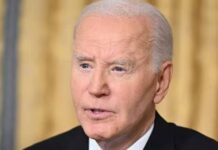
This was the news President Trump was waiting for. Everything is going according to plan.
And Trump is grinning ear to ear after Leftists just suffered a brutal defeat in the Senate.
In a decision that sparked heated debate, the U.S. Senate confirmed former Representative Tulsi Gabbard as the Director of National Intelligence (DNI) on Wednesday. The vote, which ended in a narrow 52-48 confirmation, saw Senator Mitch McConnell (R-Ky.) joining all 47 Democrats in opposition to Gabbard’s appointment.
Gabbard, an Army Reserve lieutenant colonel and former Democratic congresswoman from Hawaii, now takes on a pivotal role as the principal intelligence adviser to President Trump. Her confirmation follows a series of intense Senate hearings marked by sharp partisan divisions.
“I think it’s fair to say that Ms. Gabbard’s nomination has generated a bit more interest and attention than do most nominees,” Senate Intelligence Committee Chairman Tom Cotton (R-Ark.) remarked at the beginning of her confirmation hearing in January.
Cotton, after reviewing extensive FBI background checks and related documents, vouched for Gabbard’s spotless record, describing it as “clean as a whistle.” He accused Democrats of unfairly questioning her patriotism and judgment, recalling how former Secretary of State Hillary Clinton had previously “smeared” her as a “Russian asset.”
The Arkansas senator also expressed hope that Gabbard would refocus the Office of the Director of National Intelligence (ODNI) on its core mission of intelligence gathering while reducing bureaucratic inefficiencies.
Gabbard, known for her staunch opposition to government overreach and her criticism of U.S. intelligence failures, reinforced this vision in her testimony. “For too long, faulty, inadequate, or weaponized intelligence has led to costly failures and the undermining of our national security,” she stated, citing the Iraq War as a prime example of intelligence missteps.
“President Trump’s re-election is a clear mandate from the American people to break this cycle of failure, end the weaponization/politicization of the [intelligence community], and begin to restore trust in those who have been charged with the critical task of securing our nation,” she continued.
Gabbard’s journey to this influential post has been anything but conventional. A four-term congresswoman and a 2020 Democratic presidential contender, she made headlines last year when she endorsed Trump in the final months of the election campaign. Her endorsement, along with that of Health and Human Services Secretary-designate Robert F. Kennedy Jr., led some Republicans to claim that Democrats opposed their nominations out of political retribution.
Criticism from her former party members was swift and pointed. Some Democrats took issue with Gabbard’s past support for NSA whistleblower Edward Snowden and her skepticism toward U.S. intelligence assessments regarding Syrian dictator Bashar al-Assad’s use of chemical weapons.
Sen. Mark Warner (D-Va.), vice chairman of the intelligence committee, labeled Trump’s picks for DNI and HHS as the “worst nominees to date” and condemned Gabbard for her stance on Snowden and NATO. “This woman who can’t even call Snowden a traitor or still even blames NATO for the invasion of Ukraine,” Warner said in a video on Wednesday that was posted on X, reaffirming his opposition.
During her confirmation hearing, Gabbard defended her previous positions, stating that she had confronted Assad directly about his regime’s actions, including the use of chemical weapons. Meanwhile, Sen. Jerry Moran (R-Kan.) pressed her on her past assertion that Russia’s invasion of Ukraine was driven by “legitimate security concerns regarding Ukraine’s becoming a member of NATO.” Gabbard dismissed the criticism, stating she was “offended by the question” and reaffirming that no country or individual would be exempt from scrutiny.
To help sway hesitant Republicans, Cotton enlisted former Senator Kyrsten Sinema (I-AZ), who reportedly played a role in securing support from GOP Senators Susan Collins (R-Maine) and Todd Young (R-Ind.).
Another sticking point in her nomination process was her past attempt to repeal Section 702 of the Foreign Intelligence Surveillance Act (FISA), which permits warrantless surveillance of foreign nationals but also inadvertently collects data on U.S. citizens.
Some Republicans, including Sens. Joni Ernst (R-Iowa) and Mike Rounds (R-S.D.), expressed concerns over her reluctance to label Snowden a traitor. To address these concerns, Gabbard penned a Newsweek op-ed promising to prevent “Snowden-like” leaks in the future. “Snowden should have raised his concerns about illegal surveillance through authorized channels,” she said.
Gabbard also revised her stance on FISA Section 702 during the confirmation process, acknowledging its critical role in intelligence operations. “Foreign surveillance on non-U.S. persons overseas is critical, period,” she affirmed.
The Senate voted 52-46 along party lines to end debate on her nomination Monday, following a similarly partisan vote in the Senate Intelligence Committee last week.
Before entering the U.S. House, Gabbard served in the Hawaii legislature and was later deployed overseas as a National Guard officer during the Iraq War. Now, as the head of ODNI, she is poised to reshape U.S. intelligence policy in a way that aligns with her longstanding views on civil liberties, military intervention, and national security.
Stay tuned to The Federalist Wire.



















